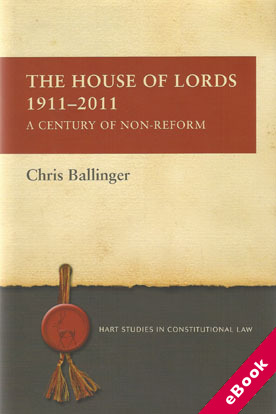
The device(s) you use to access the eBook content must be authorized with an Adobe ID before you download the product otherwise it will fail to register correctly.
For further information see https://www.wildy.com/ebook-formats
Once the order is confirmed an automated e-mail will be sent to you to allow you to download the eBook.
All eBooks are supplied firm sale and cannot be returned. If you believe there is a fault with your eBook then contact us on ebooks@wildy.com and we will help in resolving the issue. This does not affect your statutory rights.
House of Lords reform is often characterised as unfinished business: a riddle that has been left unanswered since 1911. But rarely can an unanswered riddle have had so many answers offered, even though few have been accepted; indeed, when Viscount Cave was invited in the mid-1920s to lead a Cabinet committee on Lords reform, he complained of finding “the ground covered by an embarrassing mass of proposals”. That embarrassing mass continued throughout the twentieth century. Much ink has been spilled on what should be done with the upper House of Parliament; but much less ink has been expended on why reform has been so difficult to achieve.
This book analyses in detail the principal attempts to reform the House of Lords. Starting with the Parliament Act of 1911 the book examines the century of non-reform that followed, in the process drawing upon substantial archival sources, many of which have been under-utilised until now. These sources challenge many of the existing understandings of the history of House of Lords reform and the reasons for success or failure of reform attempts, starting by arguing against the popular idea that the 1911 Act was intended by its supporters to be a temporary measure.